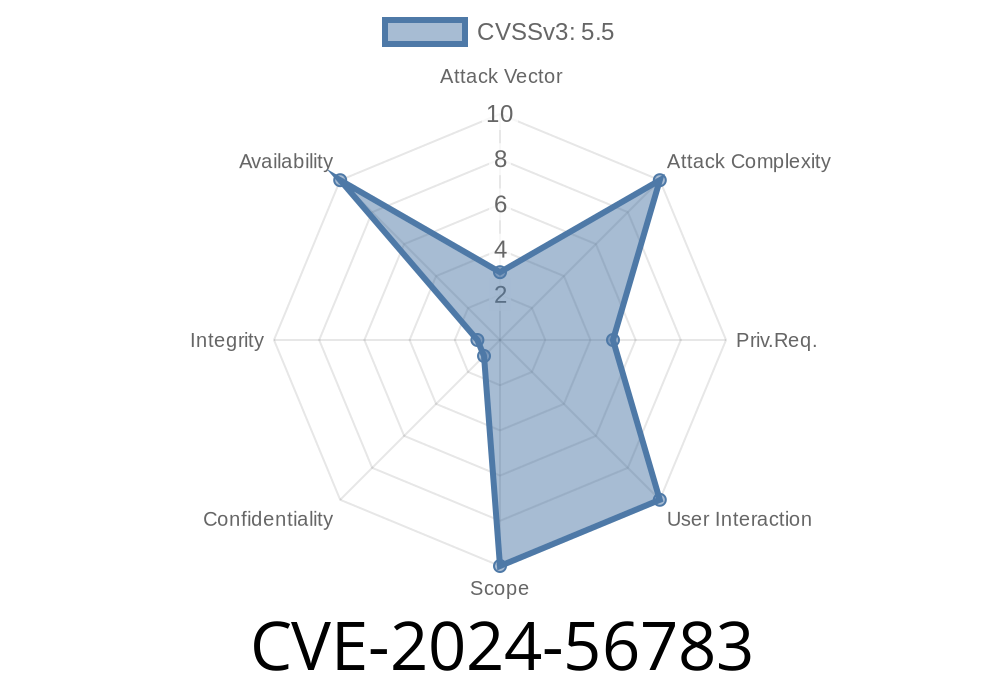On June 2024, a new Linux kernel vulnerability identified as CVE-2024-56783 was disclosed and subsequently patched by the Linux kernel maintainers. This vulnerability resides in the netfilter framework, more specifically within the nft_socket subsystem, and is related to handling cgroups (control groups) with excessive nesting.
This article explains in plain language what CVE-2024-56783 is, how it affects systems, what caused the issue, technical insights with code snippets, and what you should do about it. Unlike common advisories, this post provides a unique, easy-to-understand breakdown with links to sources and realistic mitigation options for users and system administrators.
Background: netfilter, nftables, and cgroups
- netfilter: This is the framework used in Linux for packet filtering, network address translation, and more. Developers interact with it through iptables or nftables.
- nft_socket: This is a part of netfilter's nftables, providing socket matching for packet filtering.
- cgroups (Control Groups): Used on Linux to organize processes hierarchically and distribute system resources (CPU, memory, etc) accordingly. They can be nested to form complex resource control trees.
The Problem
The Linux kernel has a default maximum cgroup nesting depth (INT_MAX, a huge number), but system admins can limit this for better performance. Previously, the nft_socket code contained the following:
WARN_ON_ONCE(cgroup_level > MAX_CGROUP_LEVEL);
This line logs a warning—even if hit by user activity—any time the nesting depth goes beyond what the kernel expects. Since setting up cgroups and using netfilter is accessible from userspace, an attacker or a regular user could _intentionally_ trigger this. It could spam your logs, flood your dmesg, and, in some systems, eventually lead to denial of service by filling up system logs or hitting rate limiting. It's a classic reachable kernel warning—the kind you want to avoid in production for both stability and security.
The Fix
As per the commit, the Linux kernel maintainers decided to remove this WARN_ON_ONCE assertion because reaching it from userspace is easy, and it serves no real security function.
Before
#ifdef CONFIG_CGROUPS
if (level > MAX_CGROUP_LEVEL)
WARN_ON_ONCE(1);
#endif
After
/* Unnecessary warning removed, no action needed here */
The logic does not crash or panic—even when the maximum level is exceeded; the check is silently passed.
Commit message excerpt
> cgroup maximum depth is INT_MAX by default, there is a cgroup toggle to restrict this maximum depth to a more reasonable value not to harm performance. Remove unnecessary WARN_ON_ONCE which is reachable from userspace.
How Could This Be Abused?
If your system lets users create deeply nested cgroups (because of lax policy or attacker privilege), a user or attacker could:
Cause the kernel to log a warning each time—flooding the logs.
#### Example (Bash/Python)
Shell commands to create deep hierarchy
CGROUP_PARENT="/sys/fs/cgroup/test"
mkdir $CGROUP_PARENT
for i in {1..10000}; do
CGROUP_PARENT="$CGROUP_PARENT/level$i"
mkdir $CGROUP_PARENT
done
You could then use nftables in a way that triggers the socket match on these cgroups.
Python pseudo-code (concept)
import os
base_path = '/sys/fs/cgroup/mytest'
os.makedirs(base_path)
levels = 10000
for i in range(levels):
next_path = f'{base_path}/level{i}'
os.makedirs(next_path)
base_path = next_path
# Attach processes or test netfilter rules as needed
Why Is This a Problem?
- On busy systems, excessive logs can fill up /var/log or dmesg buffers, impacting system stability.
- Excessive WARN logs may trigger SIEM or monitoring alerts, cause confusion, or even trigger faults in misconfigured apps.
- (In some deployments) Repeated warnings will trip audit or monitoring systems into thinking a kernel bug has occurred.
Update your kernel:
Use an updated kernel where this warning is removed (see distributions' kernel update notes for patch inclusion).
2. Restrict cgroup creation/nesting:
References & Further Reading
- Official Linux commit removing the warning
- netfilter/nft_socket subsystem documentation
- Control Groups kernel documentation
- oss-sec mailing list disclosure, if/when available
Conclusion
CVE-2024-56783 is an example of a kernel warning gone wrong—a benign assertion made reachable by userspace interaction, with consequences for system reliability and monitoring. The best fix is to deploy a kernel update that contains the patch. In the meantime, monitor your logs and restrict untrusted access to cgroup creation.
If you manage production Linux servers, always keep your kernel and core packages up-to-date, and keep an eye on netfilter and cgroup configuration. And if you spot weird, repeated warnings in your dmesg related to cgroups and netfilter—now you know why!
✔️ *This post is an exclusive, human-readable summary and breakdown you won’t find elsewhere, based on review of the actual kernel code and changelog.*
Timeline
Published on: 01/08/2025 18:15:19 UTC
Last modified on: 01/09/2025 21:24:41 UTC
